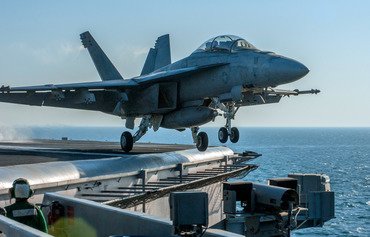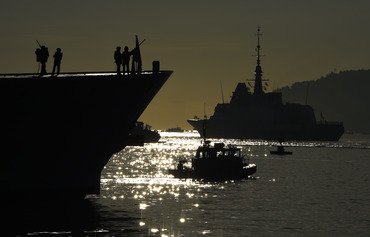International coalition partners have been working to ensure freedom of navigation in the waters of the Arabian Gulf region and to protect international shipping lanes from the threat of naval mines, regional experts said.
As part of their commitment to keeping vital sea lanes open, US, British and French naval forces recently conducted a naval mine countermeasure exercise in Bahraini waters, dubbed Artemis Trident.
Freedom of navigation will not be safe until all states that threaten navigation security are reined in, said Saudi political analyst Abdulrahman al-Mulhim.
Iran’s Islamic Revolutionary Guard Corps (IRGC) and its regional proxies threaten the security of international navigation, he told Al-Mashareq.
![The French FS L'Aigle ship sails during a joint de-mining drill between the US, British and French navies in the Arabian Gulf on April 15th, 2019. [Giuseppe Cacace/AFP]](/cnmi_am/images/2019/05/14/18034-France-demining-drill-600_384.jpg)
The French FS L'Aigle ship sails during a joint de-mining drill between the US, British and French navies in the Arabian Gulf on April 15th, 2019. [Giuseppe Cacace/AFP]
"Since the US designated the IRGC as a terrorist organisation, the tension and threat posed by Iran intensified, especially concerning the Strait of Hormuz," he said.
This increases the likelihood that Iranian forces will lay more naval mines in the strait "and thus threaten the security of global navigation", al-Mulhim added.
US regional partners will in turn seek "to strengthen the mechanisms of joint co-operation to ensure the safety of maritime navigation", he said.
This will include naval military manoeuvers along the lines of Artemis Trident, to enhance the ability of the participating militaries to secure ships and tankers.
On Sunday (May 12th), the UAE said that four commercial vessels of various nationalities had been targeted by acts of sabotage off the emirate of Fujairah in the Gulf of Oman.
Saudi Energy Minister Khalid al-Falih said two of the four vessels were Saudi oil tankers, noting that they suffered "significant damage" but there were no casualties or any oil spill.
One of the two tankers that was attacked was on its way to be loaded with crude oil from a Saudi terminal for customers in the US, al-Falih said.
Joint naval exercises
Maritime transport is of great importance to international trade worldwide, as "90% of the volume of international trade relies on shipping and the handling of goods in ports", Bahraini journalist Tamam Abu Safi told Al-Mashareq.
Naval mines are one of the main security challenges in the Arabian Gulf, she said, with regional and allied naval forces giving this issue top priority.
"That is the reason we are constantly seeing joint naval exercises conducted to deal with these challenges, whether it is naval mines, terrorist attacks or weapons smuggling," she said.
"The US-regional exercises, usually led by the US, focus on advanced tactics such as visit, board, search and seizure (VBSS), and these exercises are in line with international standards," she said.
"Naval mine clearing is typically one of the most difficult tasks undertaken by any naval force in the world because it requires joint action, as well as maps and ships equipped with state-of-the-art counter-mine technology," she said.
"Mine countermeasure exercises also require a large maritime geographic area, and the cost of dealing with mines is always high compared to other military tasks," she said.
The conduct of these drills "demonstrates the commitment of the US and regional allies to protect the safety of navigation and to deal with anything that would pose a major threat to navigation", she added.
Naval mine countermeasures
Abu Safi said the attention given to mine countermeasures during the Artemis Trident exercise comes in response to this emergent challenge.
She pointed to Iranian threats concerning the Strait of Hormuz, which have prompted the US to station four mine countermeasure vessels (minesweepers) in the region, which conduct regular patrols.
Unmanned underwater vehicles (UUV) including the SeaFox and Mk 18 Mod 2 Kingfish, which have minesweeping capabilities, also have been added to the US Navy's 5th Fleet.
"The joint exercise between the French and British navies and US naval forces on mine countermeasures in the Arabian Gulf will ensure the freedom of maritime navigation," said Bahraini author and political writer Saad Rashed.
Vessels will be able to navigate these waters "without fear of the dangers posed by these mines", which threaten international navigation, he told Al-Mashareq.
"Amid the repeated threats by Iran to close the Strait of Hormuz and continued threats made by Yemen's Houthis (Ansarallah) concerning the Strait of Bab al-Mandab, the international community had to act," he said.
The mine countermeasures and training exercises in the Arabian Gulf are "a clear indication of the importance of sea lanes", which must be protected "from aggression by rogue states", Rashed said.
He said he expects there will be similar exercises conducted in the future, and that there will be joint efforts by Gulf states on mine countermeasures.
The decision to conduct this exercise in Bahraini waters is "an affirmation of Bahrain’s strategic location that allows easy access to the northern and southern parts of the Arabian Gulf", he added.

![A scuba diver sits in front of a mine on board the HMS Ledbury ship during a joint de-mining drill between the US, British and French navies in the Arabian Gulf on April 15th. [Giuseppe Cacace/AFP]](/cnmi_am/images/2019/05/14/18042-Scuba-diver-mine-600_384.jpg)
![An MH-53E Sea Dragon flies over the Bahraini capital Manama during a joint de-mining drill between the US, British and French navies in the Arabian Gulf on April 15th. [Giuseppe Cacace/AFP]](/cnmi_am/images/2019/05/14/18035-Sea-Dragon-helicopter-600_384.jpg)
![Two mines are pictured on board the HMS Ledbury during a joint de-mining drill between the US, British and French navies in the Arabian Gulf on April 15th. [Giuseppe Cacace/AFP]](/cnmi_am/images/2019/05/14/18036-Mines-Ledbury-ship-600_384.jpg)
![Scuba divers float near the French FS L'Aigle ship during a joint de-mining drill between the US, British and French navies in the Arabian Gulf on April 15th. [Giuseppe Cacace/AFP]](/cnmi_am/images/2019/05/14/18037-Scuba-divers-mines-600_384.jpg)
![A French officer walks past a submarine Sonar device used on the Lewis B. Puller carrier during a joint de-mining drill between the US, British and French navies in the Arabian Gulf on April 15th. [Giuseppe Cacace/AFP]](/cnmi_am/images/2019/05/14/18038-Submarine-sonar-device-600_384.jpg)
![An officer works on board of the HMS Ledbury ship during a joint de-mining drill between the US, British and French navies in the Arabian Gulf on April 15th. [Giuseppe Cacace/AFP]](/cnmi_am/images/2019/05/14/18040-Ledbury-control-panel-600_384.jpg)
![A flight specialist walks towards an MH-53E Sea Dragon on the deck of the Lewis B. Puller carrier during a joint de-mining drill between the US, British and French navies in the Arabian Gulf on April 15th. [Giuseppe Cacace/AFP]](/cnmi_am/images/2019/05/14/18041-Sea-Dragon-helicopter-600_384.jpg)





